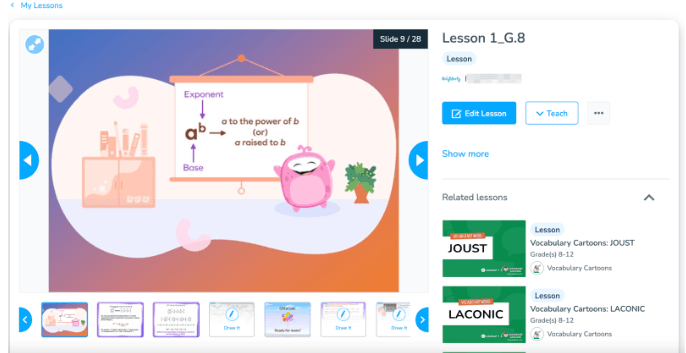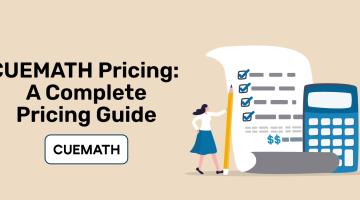What Do 8th Graders Learn in Math?
reviewed by Jo-ann Caballes
Updated on January 23, 2025
As 7th graders transition to 8th grade, children start to deal with multi-step word problems that use whole numbers, decimals, fractions, and percentages simultaneously. While this can be pretty frustrating, parents and teachers should ensure that kids know that 8th-grade math concepts teach them not only problem-solving but also how to be independent thinkers.
What do you learn in 8th-grade math?
Essential 8th-grade math skills your child should know include:
- Using linear equations in one and two variables
- Creating graphs and other diagrams to illustrate those relationships
- Understanding functions, where students learn to interpret and analyze functional relationships
- Understanding irrational numbers and comparing them to rational numbers
- Understanding measures of central tendency and variability and applying them to real-life scenarios
- Operating with rational numbers and the applications of percentage, rate, and proportion
- Applying the Pythagorean Theorem to find unknown lengths in right triangles and explaining why it works
- Computing square roots and their opposite exponents
The skills students learn in 8th grade aren’t easy, especially in math. Kids who had troubles in previous years may have some difficulties keeping up, so it’s important to build confidence in math by eighth grade.
By the end of the academic year, children should have a solid foundation in these areas. That prepares them for more complex math concepts in high school, including Algebra I and Geometry. The main focus of 8th-grade level math is not on mechanical calculation but on really understanding math concepts so they can be applied in real-life day-to-day situations. This approach aims to build a strong mathematical mindset that is vital for future academic and career success, especially in fields that require quantitative analysis (STEM disciplines).
What to do to help your kid conquer 8th-grade math topics?
Strategies that help your kid mastering 8th-grade math include providing emotional support, establishing routines, and maintaining open communication.
But what if your child faces more serious emotional challenges during puberty that interfere with a healthy family dynamic? 8th grade can be a real hassle for a family, especially since your child is actively going through puberty. Emotional, physical, and cognitive changes can sometimes impact their academic performance, leading to bad grades and frustration both on the kid’s and parents’ side.
Children aren’t always open about what’s going on in school, let alone discussing what is not going well. Asking your kid about the possible challenges is not helping either, as you might get tears or angry outbursts as an answer. After all, it is not easy to be your child’s best friend, especially in moments like this. Supporting your child’s learning at home can be ineffective because of these mood swings, so seeking additional resources that encourage a positive attitude toward math can be a good idea.
Seeking additional resources
Doesn’t it feel, at times, that school math teaching methods are designed to make your children suffer? It seems like complaints from your 13-year-old never end, and a confusing school math curriculum isn’t helping at all. Studies have shown that game-based learning environments (exactly the ones that are not being practiced at traditional schools) can support significant improvements in students’ mathematical skills, especially when games are designed with educational purposes in mind. As children explore this world through play, real-life math games with real rewards will help them master complex concepts much faster.
How do 8th graders learn math with Brighterly
If your child is falling behind in math in 8th grade, online math tutoring that incorporates game-based math learning can be a solution. Platforms like Brighterly can boost your child’s math skills with the help of professional math tutors who take into consideration each kid’s needs and temper.

And the best thing, Brighterly doesn’t just load kids with facts without explaining the real world behind them. It helps them understand how math can be utilized in their everyday life.
What math is taught in 8th grade
Math in 8th grade sets the stage for what children will learn in high school and typically covers these basic programs:
8th-grade Pre-Algebra
Pre-Algebra is normally taught in middle school math and prepares children for more advanced math concepts of Algebra I. It’s the first step toward complex math problems and helps kids lay a good foundation for Algebra I.
Pre-Algebra explores topics like:
- Scientific notations, exponents, and roots
- Expressions and variables
- Rational number word problems and percents
- Percentages
- Proportional relationships
- Functions and linear models
- Factors and Multiples
- One-step and two-step equations and inequalities
- Patterns
- Exponents Intro and Order of Operations
- Equations and inequalities – introduction
- Ratios and Rates
- Multi-step equations
- System of equations
8th-grade Algebra I
Algebra I is typically introduced in 9th grade. However, students who excel in math are offered more advanced courses like Algebra I as well. A report by the U.S. Department of Education in 2018 says children who take Algebra I in 8th grade perform better in high school and college.
Algebra I includes the following topics:
- Exponents and radicals
- Sequences
- Inequalities
- Absolute value and piecewise functions
- Functions
- Exponential growth and decay
- Forms of linear equations
- Linear equations and graphs
- System of equations
- Creativity in algebra
- Solving equations and inequalities
- Quadratic functions and equations
- Working with units
- Irrational numbers
8th-grade Geometry
Geometry in 8th-grade math creates the setting for future understanding of more difficult geometry concepts. For instance, this is the first year that children make proofs to prove that something is true. As this is a pivotal year for geometry class, kids who fail to grasp these concepts will more likely struggle in future math classes.
Geometry in 8th grade focuses on:
- Exploring different types of triangles and their properties
- Using the Pythagorean Theorem to solve problems
- Calculating the volume and surface area of solid figures
- Using the coordinate plane to solve geometric problems
Students also get introduced to important geometry vocabulary like:
- Line Segment
- Reflection
- Plane
- Dilation
- Point
- Line
- Translation
- Rotation
A basic understanding of these terms is crucial for later understanding of high school geometry class.
What does 8th-grade math look like?
The primary focus for an 8th-grade math curriculum is algebra, number sense and operations, geometry, and measurement and spatial sense. Data analysis and probability are also included. While these math topics might be a surprise, they are vital for 8th-grade math skills your child should know.

What to do to succeed in 8th-grade math?
- Build a schedule
- Practice like a pro
- Find a reliable tutor
As your child transitions to 8th grade, setting some rules and routines is recommended. Doing well in 8th-grade math is important to build a strong foundation for high school, as well as for future academic and career success. Here is a more detailed breakdown of how to succeed in 8th-grade math:
Build a schedule
Planning is important, especially at the delicate age of adolescence, when every minor inconvenience can disrupt the normal pace of the day. Creating a study schedule and setting realistic goals will help your kid tackle 8th-grade head-on.
Practice like a pro
Practicing like a champion does not require your kid to overwork. Regular and conscious practice is enough to stay on the right track.
Also, practicing with worksheets is a great way to test their understanding and identify areas of improvement.
Find a reliable tutor
Having difficulties in school math is completely normal. For some kids, it can be a temporary setback, while for others, handling 8th-grade math may be a serious challenge. Getting help from supportive math tutors who take into account math knowledge gaps your kid might have is advisory.
Online tutoring at platforms like Brighterly is the perfect solution for children who don’t feel much confidence in math. 1:1 sessions foster a more supportive environment, making it easier for your kid to catch up with complex math problems.
What should 8th graders know in math?
First and foremost, your child has to understand that 8th-grade math focuses on how to approach complex problems by breaking them down into smaller parts. This teaches them problem-solving, an essential skill across all disciplines and everyday life.
But generally, 8th-grade math objectives include defining and differentiating between different types of sampling techniques, using technology to determine the mean, median, and mode, identifying rational and irrational numbers, and describing meanings, solving problems in two variables using linear equations, calculating and approximate principal square roots, and identifying and perform transformations of a figure on a coordinate plane.
Conclusion
To wrap things up, 8th-grade math covers algebra, geometry, and data analysis, which are essential foundations for high school. Providing support with game-based learning and professional tutoring is an optimal choice for kids who struggle in math. Additionally, encouragement and open communication between parents and children help navigate 8th grade effectively in order to prepare children for later grades.
Claim a free trial lesson with Brighterly to create a positive and supporting environment for your kids — and make sure your child succeeds in math in 8th grade and later academic years.














